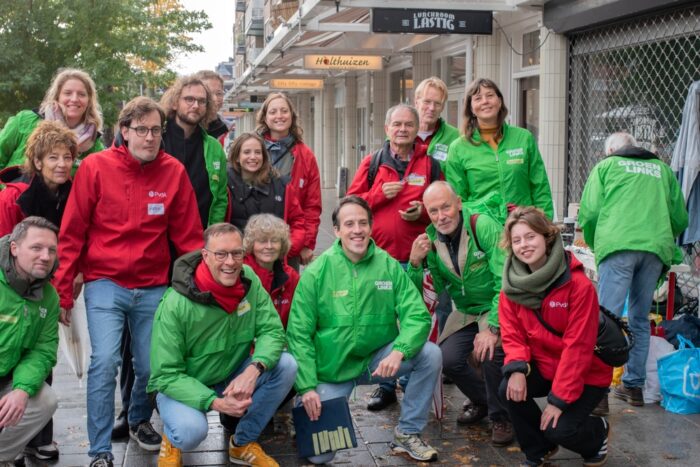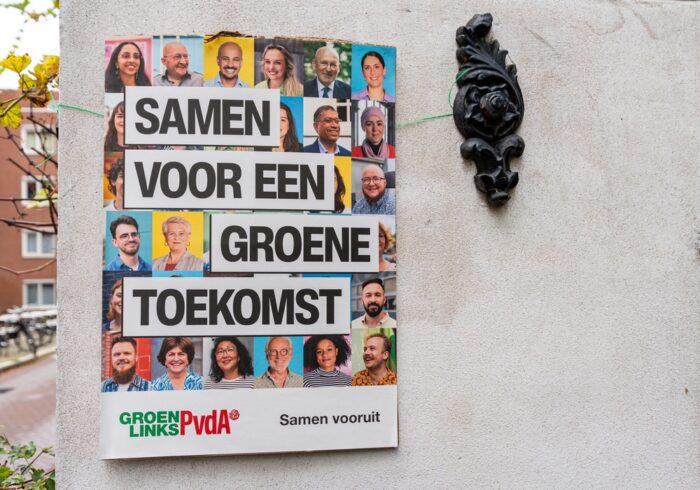Find all related Progressive Post
Progressive Post

The 2017 presidential election marked a major shake-up in French politics, with the election of the youngest president of the 5th Republic, who had entered politics two years earlier. In just a few months, Emmanuel Macron shattered the party system that had gradually taken hold in France over the previous forty years. In the face of the great anxiety gripping part of Western society due to the populist wave that has led to Brexit and then the election of Donald Trump, he had brilliantly succeeded in opposing an ‘elite populism’ and offering an alternative to the more traditional populism embodied by Marine Le Pen on the right and Jean-Luc Mélenchon on the left.
In 2019, French political life seemed to be gradually reorganising itself around a new division between ‘progressives’ and ‘nationalists’, as desired by both the president of the Republic and his opponent in the second round of the 2017 election, Marine Le Pen. The legislative elections held over the last two weeks have completely shattered this scenario, replacing it with a political landscape divided into three blocs: the left coalition, the centrist coalition and the far right.
The European elections as well as the first round of the legislative elections confirmed Marine Le Pen’s Rassemblement National’s (National Rally) ability to massively expand its electorate. It managed to retain the massive support of the categories that have made it so successful over the last 30 years: the working classes, especially blue-collar workers (53 per cent of whom voted for the RN) and the low-skilled (48 per cent). But the far right also made phenomenal inroads into the middle classes, winning 26 per cent of their votes. Its alliance with some conservative dissidents in 60 constituencies also helped it increase its share of the vote among the elderly, a strategic segment in French elections, from 24 per cent to 29 per cent between the two elections.
At the same time, the left coalition confirmed its strength among young voters (38 per cent), especially if they lived in large metropolitan areas. It also confirmed its dominance among the highly educated (35 per cent). However, the electoral alliance of several left-wing parties (Nouveau Front Populaire, NFP), essential in the French electoral system to qualify for the second round, led voters of Macron in 2022, who chose the Socialist Party in the European elections, to return to Macron’s candidates. This explains why the result of the Left (28 per cent) was lower than the addition of the votes of the four members of the coalition in the European elections (31.5 per cent). The loss was mainly among white-collar workers (from 38 to 33 per cent) and the over-65s (from 28 to 22 per cent).
These voters were reluctant to vote for a coalition that included Mélenchon’s radical left party (La France Insoumise, ‘France unbowed’). They reverted to voting for the centrist coalition, which mitigated the sociological collapse of ‘Macronism’. The dizzying fall in support for the president’s party during the European elections, to the point of almost disappearing among voters under 35 and the working classes, was partially reversed three weeks later, allowing Ensemble to regain decent scores among young people (15 per cent, +11 points) or workers (11 per cent, +6 points) and service workers (15 per cent, +9 points). Parallel gains among white-collar workers (+11) and the middle class (+8) were enough to qualify many of their candidates for the second round.
As the campaign was very short (three weeks), the issues debated before the first round were the same as in the runup to the European elections and tended to favour the National Rally: purchasing power, security and immigration, exactly the issues that Le Pen has taken up for many years. On the other hand, climate change, a key issue for progressives, was virtually absent from this campaign.
On the evening of the first round, the country seemed to be quietly moving towards an unprecedented shift and the arrival of the far right in power. But that was without considering France’s first-past-the-post with two rounds electoral system, where the National Rally is, so far, unable to mobilise enough voters to break through in the second round. The massive withdrawal of candidates from the Left and centre was more effective than expected in blocking Le Pen’s party. On election day, 46 per cent voted to avoid the National Rally, while only 36 per cent did the same to avoid a victory for the left-wing coalition and 18 per cent to avoid Macron’s alliance. With 143 deputies in the new National Assembly, the National Rally won 55 seats compared to previous elections, but it failed to break the glass ceiling in crucial categories and win a majority of votes in many constituencies. For example, it won only 32 per cent of the over-65 vote, barely three points more than in the first round. This is notoriously insufficient given that this age group now represents more than one in four registered voters in the country and almost 30 per cent of the electorate.
The question now is whether the ‘republican barrage’ that was so effective last Sunday will continue to work in the next election, which will likely be the presidential election in 2027. From this point of view, the reconstruction of a progressive political offer that is perceived as acceptable by the moderate electorate is a crucial issue. Indeed, in the duels between a left-wing candidate and a candidate from the National Rally in the second round, the far right was almost on a par with the candidates from Mélenchon’s party, despite the withdrawal of centrist candidates between the two rounds. As things currently stand, a duel between Le Pen and Mélenchon in the runoff of the 2027 presidential elections, would currently be the National Rally candidate’s best chance of winning the Élysée in three years’ time.
Photo Credits: Shutterstock.com/kipgodi
| Cookie | Duration | Description |
|---|---|---|
| cookielawinfo-checkbox-advertisement | 1 year | Set by the GDPR Cookie Consent plugin, this cookie is used to record the user consent for the cookies in the "Advertisement" category . |
| cookielawinfo-checkbox-analytics | 11 months | This cookie is set by GDPR Cookie Consent plugin. The cookie is used to store the user consent for the cookies in the category "Analytics". |
| cookielawinfo-checkbox-functional | 11 months | The cookie is set by GDPR cookie consent to record the user consent for the cookies in the category "Functional". |
| cookielawinfo-checkbox-necessary | 11 months | This cookie is set by GDPR Cookie Consent plugin. The cookies is used to store the user consent for the cookies in the category "Necessary". |
| cookielawinfo-checkbox-others | 11 months | This cookie is set by GDPR Cookie Consent plugin. The cookie is used to store the user consent for the cookies in the category "Other. |
| cookielawinfo-checkbox-performance | 11 months | This cookie is set by GDPR Cookie Consent plugin. The cookie is used to store the user consent for the cookies in the category "Performance". |
| csrftoken | past | This cookie is associated with Django web development platform for python. Used to help protect the website against Cross-Site Request Forgery attacks |
| JSESSIONID | session | The JSESSIONID cookie is used by New Relic to store a session identifier so that New Relic can monitor session counts for an application. |
| viewed_cookie_policy | 11 months | The cookie is set by the GDPR Cookie Consent plugin and is used to store whether or not user has consented to the use of cookies. It does not store any personal data. |
| Cookie | Duration | Description |
|---|---|---|
| __cf_bm | 30 minutes | This cookie, set by Cloudflare, is used to support Cloudflare Bot Management. |
| S | 1 hour | Used by Yahoo to provide ads, content or analytics. |
| sp_landing | 1 day | The sp_landing is set by Spotify to implement audio content from Spotify on the website and also registers information on user interaction related to the audio content. |
| sp_t | 1 year | The sp_t cookie is set by Spotify to implement audio content from Spotify on the website and also registers information on user interaction related to the audio content. |
| Cookie | Duration | Description |
|---|---|---|
| CONSENT | 2 years | YouTube sets this cookie via embedded youtube-videos and registers anonymous statistical data. |
| iutk | session | This cookie is used by Issuu analytic system to gather information regarding visitor activity on Issuu products. |
| s_vi | 2 years | An Adobe Analytics cookie that uses a unique visitor ID time/date stamp to identify a unique vistor to the website. |
| Cookie | Duration | Description |
|---|---|---|
| NID | 6 months | NID cookie, set by Google, is used for advertising purposes; to limit the number of times the user sees an ad, to mute unwanted ads, and to measure the effectiveness of ads. |
| VISITOR_INFO1_LIVE | 5 months 27 days | A cookie set by YouTube to measure bandwidth that determines whether the user gets the new or old player interface. |
| YSC | session | YSC cookie is set by Youtube and is used to track the views of embedded videos on Youtube pages. |
| yt-remote-connected-devices | never | YouTube sets this cookie to store the video preferences of the user using embedded YouTube video. |
| yt-remote-device-id | never | YouTube sets this cookie to store the video preferences of the user using embedded YouTube video. |
| yt.innertube::nextId | never | This cookie, set by YouTube, registers a unique ID to store data on what videos from YouTube the user has seen. |
| yt.innertube::requests | never | This cookie, set by YouTube, registers a unique ID to store data on what videos from YouTube the user has seen. |
| Cookie | Duration | Description |
|---|---|---|
| COMPASS | 1 hour | No description |
| ed3e2e5e5460c5b72cba896c22a5ff98 | session | No description available. |
| loglevel | never | No description available. |


